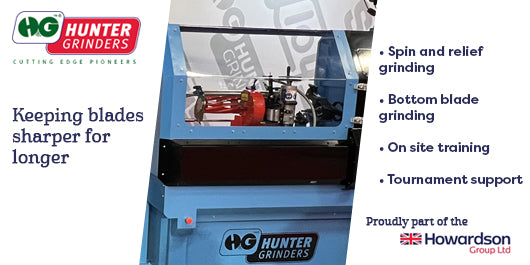‘The price of everything and the value of nothing’
Trainer and Conference Speaker Frank Newberry has been helping greenkeepers, gardeners and groundsmen to be more successful since 1989.

In this edition of the magazine, Frank looks at how we might respond to the challenge of cynicism in the workplace. He also lists ten of his articles (available online) that support the need for us all to be less cynical and more open to colleagues,more helpful perhaps to others in our profession.
The full title of this article is of course a quotation by the Irish writer Oscar Wilde (1854 - 1900) which reads “A cynic is a man who knows the price of everything, and the value of nothing.”
Such elegant condemnation in so few words!
When I first read the quotation as a young person, I was captivated by its brevity and wit. Sure it is negative, but it is such an elegant condemnation of cynicism - in so few words! I still hear this Wilde quotation being used, usually in a TV play, set in the Victorian era, or it is used as an insult or a put-down in a political debate.
A while back at work, a colleague of mine heard a more positive quotation about cynics on the radio – something I found I could use in my life; it describes a cynic as follows:
‘’A cynic, after all, is a passionate person who does not want to be disappointed again.’’
The author of the quotation was an orchestra conductor
My friend thought the source of this quotation was an orchestra conductor called Ben Zander (b.1929), but I have noticed recently that his ex-wife and friend,Rosamund Stone Zander (1942-2023), is also credited with the words.
My method for dealing with cynical people was to avoid them!
Now, until this discovery, my method for dealing with cynical people was to avoid them! Personally, there havebeen times when I did not want to be exposed to a cynic’s negative, often sarcastic remarks - especially when they cleverly trick me by feigning to make a positive statement at the start, and then close on a negative, pessimistic thought.
Most cynics I have met want their elegant remarks to excuse their inertia or lack of energy when asked to take any action. I have had enough of their lack of faith, their rejection of anything positive, and their inability to be optimistic (about anything).
Previously, the best response I had was to say, ‘Sometimes it’s hard not to be cynical’. This would shut them up for a while - it may have been a surprise for them to have their cynicism accepted or validated in such an understanding way!
Cynicism is not like criticism
But, cynicism is not like criticism. Cynicism communicates a contemptuous or mocking attitude of another person’s ideas or solutions; criticism can be seen as negative, but if done well, criticism can have positive outcomes e.g. at performance reviews.
In my line of work as a trainer and consultant, my clients want me to bring some positivity and optimism with me. Yes, they want me to be realistic and critical of things that have gone wrong. But many of them really want me to deal with the negativity of their key players at work. Some of my clients have grown tired and depressed trying and failing to motivate their teams. No surprise really. Once cynicism and/or negativity is shown at the higher levels in organisations, it gives people throughout the organisation permission to be cynical as well. What can I, an outsider,do about this?
Well, Rosamund’s thinking showed me that I can do something. She advises that when you or I are with a cynic “the secret is not to speak to people’s cynicism, but to speak to their passion.”
Maybe you will have to apologise for your past cynicism
Start with yourself. When you look at yourself in a mirror,do you see a cynic? Someone others may be avoidingand blaming? Or, do you see a passionate person lurking underneath? Someone who has experienced trials and disappointments sure, but someone who is ready to learn from them, and help others who are going through them now?
Be honest. Maybe you will have to apologise for your past cynicism. I was cynical just once at work and my whole team noticed it and immediately started showing their cynicism. Are you someone who is ready to be a positive role model in the workplace? Are you ready to talk to others about their passions at work?
If you are, then help is at hand! Below are ten articles that you can access online at Pitchcare.com right now. They can help you to be open with others and supportive of their passions at work:
Managing Upwards; parts 1, 2 and 3
Transforming Performance - Upwards, Sideways and Down: Part 1 | Pitchcare
Transforming Performance - Upwards, Sideways and Down: Part 2 | Pitchcare
Managing Upwards III | Pitchcare
Can you change the future? Part II - Painless Presentations | Pitchcare
Making the Most of Meetings;
Making the most of meetings at work - Agendas for action | Pitchcare
Making the Most of Meetings at Work - Part II The Facilitator Role | Pitchcare
Making the Most of Meetings at Work - Part One - The Executive Secreta | Pitchcare
Speaking truth to power ... and to other people at work
Persuading People – Words that Work



